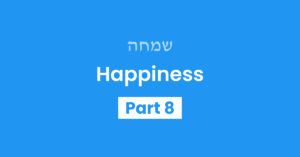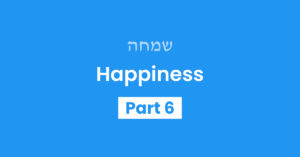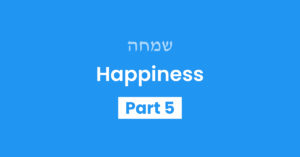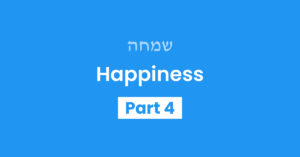Can you remember a time in your life when you felt overflowing with happiness?
Maybe it was after you passed a challenging test in school. Or when you found out you’re getting a promotion at work. Or on a day when you accomplished everything on your to-do list. Or when you won a free trip to Israel.
How did it feel? How would you define the feeling of happiness?
Rabbi Lawrence Kelemen1 defines happiness as the feeling of overflowing with goodness. When we recognize all the gifts in our lives, or feel like we accomplished something great, we feel so very blessed and “full” of goodness. We feel energetic and feel like we’re soaring on top of the world.
Rabbi Lawrence Kelemen defines happiness as the feeling of overflowing with goodness.
When a person feels this type of happiness… what does he do next?
Rabbi Kelemen explains that when a person feels like he is so full of goodness and gifts from Hashem, he will naturally feel compelled to spill over this goodness onto other people, by giving to them.
When is a better time to ask a wealthy philanthropist for a donation? When he’s in a good mood, or when he’s feeling sad? We all intuitively know that you are much more likely to get it if you ask when he’s in a good mood. As Rav Dessler2 writes: Happiness naturally leads to generosity.
Happiness naturally leads to generosity.
In fact, Dovid HaMelech expresses this exact sentiment in Tehillim (Chapter 23, beginning with “Mizmor L’Dovid”) which is often sung at Shaleshudes. When Dovid recognizes that Hashem has taken care of him every step of the way, he feels overflowing with appreciation: “Dishanta Bashemen Roshi, Kosi Rivaya – My cup is overflowing [with goodness].” When Dovid feels overflowing with Hashem’s gifts, what does he do? The pesukim continue: “Ach Tov VaChessed Yeerdifuni Kol Yemei Chayay – May good and kindness chase after me, all the days of my life.” Dovid wishes that Hashem should give him many opportunities to do chessed (kindnesses) in the future. He feels so full of goodness that he immediately feels the desire to give over that goodness to others!
Happiness Leads to Giving… And Giving Leads to Happiness
We just concluded the holiday of Purim, where we celebrated, listened to the Megillah, and fulfilled many mitzvos of the day. Which part of Purim gives us the most happiness? Is it the wine? Food? Parties? Dancing? Yes, these all make us happy… but there is something that can make a person even happier.
In the halachos of Purim, the Rambam writes: “It is better for a person to give more Matanos L’Evyonim (gifts to the poor) than to spend money on a larger meal or Mishloach Manos – for there is no greater or more glorious joy than one who gladdens the hearts of unfortunate people.” Yes, it is enjoyable to eat, drink, and celebrate on Purim, but our deepest happiness is achieved when we give to others.
There is a well-known concept that the Hebrew word for giving (נתנ) is a palindrome – it can be read the same backwards and forwards (nun-tuv-nun). Why? Because when you give, you also gain! What do you gain? You gain the happiness that comes from giving.
When we’re happy, we feel like giving.
And the more we give, the happier we’ll be.
When we’re happy, we feel like giving.
And the more we give, the happier we’ll be.
An Easy Way to Give
There are many opportunities to give of our time, money, or possessions to those in need. But if you’re overflowing with happiness and eager to give… you don’t need to wait for any special opportunity! There is something we can give to anyone at any time: A smile.
You can smile when you pass someone in the hallway, or when you open the door for them. You can smile while you’re talking or smile when you’re listening. It’s easy to smile, and it’s an easy way to give to other people.
In fact, the Sifsei Chaim3 writes that smiling is not just a nice thing to do… it’s the greatest gift we can give to another person!
Smiling is not just a nice thing to do… it’s the greatest gift we can give to another person!
Chazal teach us4: “If a person gives his friend all the gifts in the world, but his face is sunken into the earth (i.e. he looks sad), the Torah considers it as if he did not give him anything at all… but if a person smiles at his friend and doesn’t give him anything else, the Torah considers it as if he gave him EVERY good thing in the entire world!“
It’s easy to smile when we’re happy – but what about when we’re not in the best mood? The Sifsei Chaim emphasizes that it is so important to smile at people… even if you are not in the best mood. No matter what worries are on our minds, we should always strive to keep smiling at others.
And the good news is that this will work to our benefit! Because as we explained above — when you give to others, you, too, will become happy in return!
This week, let’s practice smiling at other people – which will be the greatest gift to them, and the greatest gift to ourselves.
Sources: [1] Rabbi Lawrence Keleman is the author of Permission to Believe and a world-renowned lecturer. The ideas contained here are from his audio shiur entitled Holidays – Preparing for Succot: The Secret of Happiness; [2] Rav Dessler’s Michtav Mei’Eliyahu, Strive for Truth, Vol. II. pg. 123; [3] Sifsei Chaim: Middos V’Avodas Hashem Vol. I. pgs. 308-319; [4] Avos D’Rabbi Nassan 13
Your Challenge
Once a day, smile at another person.
For an extra challenge – Try to see if you can make them smile back!
Torah Questions
- About what is it said: “Kol HaMis’angim Bah, Yizku L’Rrov Simcha – All those who delight in it, will merit tremendous joy”?
- About which holiday is it said: “V’Samachta b’Chagecha – And you will rejoice in your holiday”? (See Devarim 16)
- From which person in Tanach do we learn the rule: “Don’t mix two celebrations (simchahs) together”? (See Bereishis 29)
- It says in Mishlei (15:13) that when a person is happy, something will happen as a result of their joy. What will happen? (See Metzudas Dovid)
- Hashem said to the Jewish people (Midrash Tanchuma on Re’eh 18): “You have 4 household members [son, daughter, slave, and maidservant], and I have 4 household members. If you bring all 8 types of people together to celebrate on Yom Tov and make everyone happy, then I, too, will bring all 8 types of people together to the Beis HaMikdash and make everyone happy there.” Which 4 types of people are considered HASHEM’s household members? (See Devarim 16:14)
- After reading from the Torah in shul, we say a passuk from Mishlei (3:18) that says that those who support Torah are rich (with happiness). What are the words of the passuk?
- It says in Sefer Yeshaya (55:12): “You [the Jewish people] will LEAVE with joy, and be brought in with peace; the mountains and the valleys will break out in joy, and all the trees of the field will clap their hands.” Where will we be leaving from? (See Rashi)
Questions to Ponder
- Can you remember a time in your life when you felt so happy that it made you feel like smiling or giving to other people?
- Sometimes we feel happy but we don’t necessarily translate that happiness into generosity. Why do you think that happens?
- Why do you think Chazal teach us the principle of “Ain Me’arvin simcha b’simcha – Don’t mix two celebrations together”? (Bereishis Rabbah Vayeitzei 70)
- Rav Shimshon Rephael Hirsch (Vayikra 23:40) says that true simcha in Olam HaZeh can only be accomplished when we are joined together as a tzibur (group). Why?
- On the passuk “LaYehudim Haysa Ora V’Simcha…” the Gemara (Megilla 16b) says that “Simcha” refers to Yom Tov. Why? Why are holidays associated with joy any more than Shabbos or other joyous occasions, like the birth of a baby or a bris milah?






